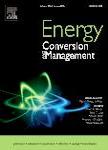版权所有:内蒙古大学图书馆 技术提供:维普资讯• 智图
内蒙古自治区呼和浩特市赛罕区大学西街235号 邮编: 010021

作者机构:Fotso Victor Univ Dschang Univ Inst Technol Dept Renewable Energy POB 134 Bandjoun Cameroon
出 版 物:《ENERGY CONVERSION AND MANAGEMENT》 (Energy Convers. Manage.)
年 卷 期:2025年第327卷
核心收录:
学科分类:0820[工学-石油与天然气工程] 08[工学] 0807[工学-动力工程及工程热物理] 0801[工学-力学(可授工学、理学学位)]
主 题:Multi-objective optimization Grey wolf optimizer Particle swarm optimizer African vultures optimizer Artificial gorilla troops optimizer Whale optimizer
摘 要:Hybrid renewable energy systems offer a sustainable and environmentally friendly alternative to traditional energy sources. However, challenges such as high energy costs and the intermittent nature of renewable resources hinder the widespread adoption of these systems. The main innovation of this work lies in the development of a hybrid meta-heuristic algorithm that combines the Grey Wolf and Whale Optimizers. This novel algorithm is applied to optimize the sizing of a wind/photovoltaic/battery hybrid system designed to meet the energy demands of administrative offices at the University Institute of Technology Fotso Victor in Bandjoun, Cameroon, where frequent power outages disrupt academic activities. To achieve optimal system performance, a mathematical framework was developed to minimize three key objective functions: levelized cost of energy, net present cost, and loss of power supply probability. Multiple meta-heuristic algorithms, including Grey Wolf, Particle Swarm, African Vultures, Artificial Gorilla Troops, and Whale Optimizers, were evaluated in the study. The proposed hybrid algorithm, which updates the positions of hunters iteratively in a spiral-shaped trajectory, demonstrated superior performance. It achieved optimal values of 5.3077E + 04 US$ for net present cost, 0.17990 US$/kWh for levelized cost of energy, and 0.000541 for loss of power supply probability. In addition, the hybrid algorithm showed better convergence trends, statistical performance, and computational efficiency compared to existing methods. The findings of this work demonstrate the potential of the proposed algorithm as a powerful tool for the optimization of hybrid renewable energy systems, particularly in resource-constrained settings where computational efficiency and solution reliability are critical. Its ability to consistently outperform existing algorithms suggests its applicability to a wide range of energy system design challenges, from microgrids in rural areas to large-sc